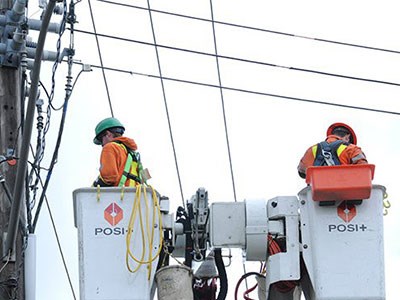Like many businesses in Ontario, hydro rates make up the second highest operating cost, after payroll, for Barrydowne Paint.
“Whether times are good, or times are bad, the electricity cost stays the same,” said Barrydowne Paint co-owner Kelly Scott. “And to have it grow like it has, hits straight to the bottom line.”
A new report by the Ontario Chamber of Commerce, done in conjunction with 40 chambers of commerce and boards of trade, including the Greater Sudbury Chamber of Commerce, found one in 20 Ontario businesses could close their doors in the next five years due to high electricity rates.
Scott said her business has taken advantage of many programs to help reduce hydro costs, including Greater Sudbury Hydro's Conservation Retrofit program, but they all come at a high cost.
“You need money in order to do that, and in order to have money to make those investments you need more manageable costs,” she said. “It's almost like a chicken and egg cycle.”
In 2014 Barrydowne Paint invested $100,000 to upgrade the lighting in its south end store, and had to defer other upgrades – to revamp the store's interior – due to that high cost.
Scott said so far this year, the company has spent spent $24,000 on electricity in its New Sudbury location – in an older building – and $10,000 at the south end store.
The Chamber of Commerce report included poll results from the firm Leger Marketing that found 81 per cent of Ontarians believe electricity prices will adversely affect the health of the economy.
In Northern Ontario, where electricity rates are typically higher due to geography and other factors, 91 per cent of respondents felt high electricity prices will adversely affect the economy's health.
Leger Marketing polled 1,000 Ontarians between June 22 and 25. The poll has a margin of error of plus or minus 3.1 percentage points, 19 times out of 20.
“I was surprised by how broadly people believe that this is a significant problem for the province,” said Geoff Jeffery, immediate past chair of the Greater Sudbury Chamber of Commerce.
The Chamber of Commerce report, called Empowering Ontario: Constraining Costs and Staying Competitive in the Electricity Market (link:http://sudburychamber.ca/wp-content/uploads/2015/07/Empowering-Ontario_GSCC_2015.pdf), made five recommendations to make Ontario's electricity rates more competitive with other jurisdictions.
The first recommendation was to increase transparency of electricity pricing and system cost drivers.
“Ontarians, myself included, don't fully understand why the rates are so high,” Jeffery said. “The system is so complex that it's hard for the average person to understand.”
Other recommendations included incentivizing the voluntary consolidation of local distribution companies, and keeping the debt retirement charge on residential bills until it has been retired.
The debt retirement charge has appeared on electricity bills since May 1, 2002, to help pay down the $38.1 billion in debt and liabilities of Ontario Hydro after it was broken up into separate companies.
As of March 2014, portion of the debt to be paid off by residential hydro customers was estimated to stand at $7.8 billion.
On April 23, 2014, the province announced it would remove the debt retirement charge from residential customers’ electricity bills after Dec. 31, 2015. This would save a typical residential ratepayer about $70 per year.
But the Ontario Chamber of Commerce has said businesses would need to pick up the slack to pay off the rest of the debt.
“Since the DRC (debt retirement charge) is calculated based on electricity consumption, the impact of this additional charge on business is considerable,” said the Ontario Chamber reprot. “Many argue that the province would be better off financially and economically if it removed the DRC from industrial electricity bills rather than residential.”
Jeffery said the province's plan to sell 60 per cent of Hydro One was a “bold move.”
The proposed sale would raise around $4 billion the province would put toward its 10-year $130-billion infrastructure plan.
While CUPE Ontario and the NDP have argued privatizing Hydro One would increase Hydro rates – due to the obligation for private companies to generate profits for their shareholders – Jeffery said that's not necessarily the case.
“The majority of the proceeds of the sale are going to be used to pay down the debt, which is a good thing,” he said.




